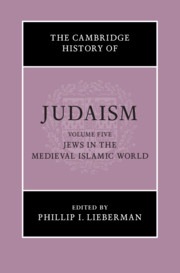Book contents
- The Cambridge History of Judaism
- The Cambridge History of Judaism
- The Cambridge History of Judaism
- Copyright page
- Contents
- Figures
- Acknowledgments
- Introduction
- Part I Jews in the Medieval Islamic World
- Part II Social and Institutional History
- Part III Spiritual and Intellectual History
- Chapter 17 Karaism
- Chapter 18 Non-Rabbinic and Non-Karaite Religious Movements
- Chapter 19 Languages and translation
- Chapter 20 Book Production
- Chapter 21 Jewish Bible Exegesis in Muslim Lands in the Middle Ages
- Chapter 22 Jewish Law
- Chapter 23 Liturgy
- Chapter 24 Piyyuṭ
- Chapter 25 Jewish Philosophy
- Chapter 26 Science and Medicine
- Chapter 27 Magic
- Chapter 28 Mysticism
- Chapter 29 Belles Lettres
- Chapter 30 Jewish-Muslim Polemics
- Chapter 31 Historiography
- Chapter 32 Material Culture, Art, and Architecture
- Index
- References
Chapter 20 - Book Production
from Part III - Spiritual and Intellectual History
Published online by Cambridge University Press: 21 August 2021
- The Cambridge History of Judaism
- The Cambridge History of Judaism
- The Cambridge History of Judaism
- Copyright page
- Contents
- Figures
- Acknowledgments
- Introduction
- Part I Jews in the Medieval Islamic World
- Part II Social and Institutional History
- Part III Spiritual and Intellectual History
- Chapter 17 Karaism
- Chapter 18 Non-Rabbinic and Non-Karaite Religious Movements
- Chapter 19 Languages and translation
- Chapter 20 Book Production
- Chapter 21 Jewish Bible Exegesis in Muslim Lands in the Middle Ages
- Chapter 22 Jewish Law
- Chapter 23 Liturgy
- Chapter 24 Piyyuṭ
- Chapter 25 Jewish Philosophy
- Chapter 26 Science and Medicine
- Chapter 27 Magic
- Chapter 28 Mysticism
- Chapter 29 Belles Lettres
- Chapter 30 Jewish-Muslim Polemics
- Chapter 31 Historiography
- Chapter 32 Material Culture, Art, and Architecture
- Index
- References
Summary
The medieval period was a time of important changes in Jewish book culture in the Muslim world. While book production and use were to some extent a continuation of ancient traditions, medieval Jewish readers discovered an array of unprecedented subjects and genres. Unlike anonymous or apocryphal transmission of antiquity, individual medieval authors strove to shape and control the circulation of their original works by fostering the notion of an “authorized” and “correct” text. Books took new physical forms and formats, used newly introduced book materials, and acquired a new status as sought after vehicles of scientific knowledge, pleasurable pastimes, or as prized collectors’ pieces. A book’s appearance depended on its cultural context but was also related to its intended destination: public use in a synagogue or a house of learning, a trophy acquisition for the library of a wealthy bibliophile, or for personal use as modest textbooks for scholars or schoolchildren. The reader and his capacity to make use of the books, his reading comfort, and his literacy and linguistic skills were all important considerations when a book was made.
- Type
- Chapter
- Information
- The Cambridge History of Judaism , pp. 666 - 700Publisher: Cambridge University PressPrint publication year: 2021

